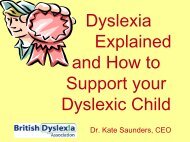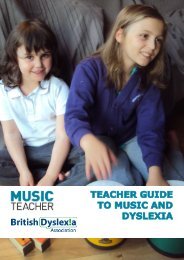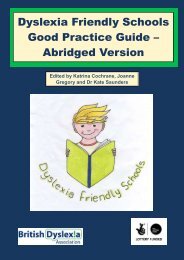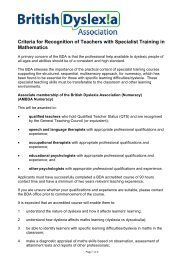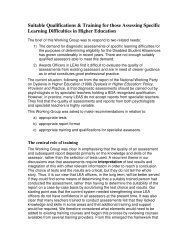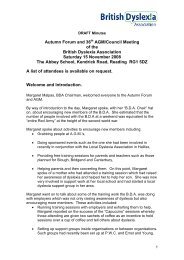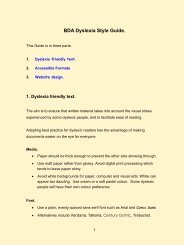Intervention for Dyslexia - The British Dyslexia Association
Intervention for Dyslexia - The British Dyslexia Association
Intervention for Dyslexia - The British Dyslexia Association
You also want an ePaper? Increase the reach of your titles
YUMPU automatically turns print PDFs into web optimized ePapers that Google loves.
impact on reading and spelling, particularly when programs incorporate speech<br />
feedback. In addition, CAL can have motivational benefits <strong>for</strong> children with dyslexia.<br />
<strong>The</strong> difficulties that most, if not all, dyslexic students encounter in secondary school may<br />
be addressed using a variety of support techniques. Conventional instruction and<br />
training can still have a significant role in this work, but, increasingly, assistive<br />
technology is used to support the learning of older dyslexics. Research studies on this<br />
are rather thin on the ground, but those that have been published indicate that word<br />
processing activities, especially those in which there are enhanced supportive features, 15<br />
significantly improve writing and spelling skills.<br />
15 Enhanced supportive features <strong>for</strong> word processing include voice dictation, text-to-speech, and<br />
sophisticated spell checking that identifies ‘dyslexic-type’ errors; conventional spelling checkers<br />
are really designed to identify typing errors rather than spelling errors and rarely provide<br />
appropriate corrections <strong>for</strong> phonological errors (e.g. ‘sitee’ will not be identified by a conventional<br />
spell checker as a misspelling of ‘city’).<br />
<strong>Intervention</strong> <strong>for</strong> <strong>Dyslexia</strong> 129



